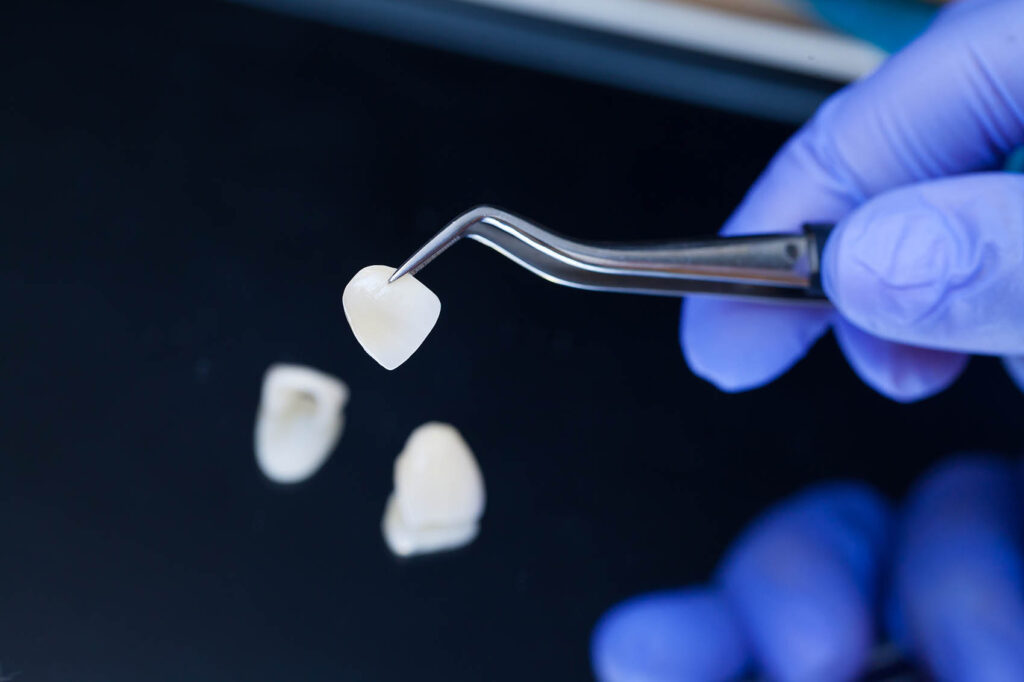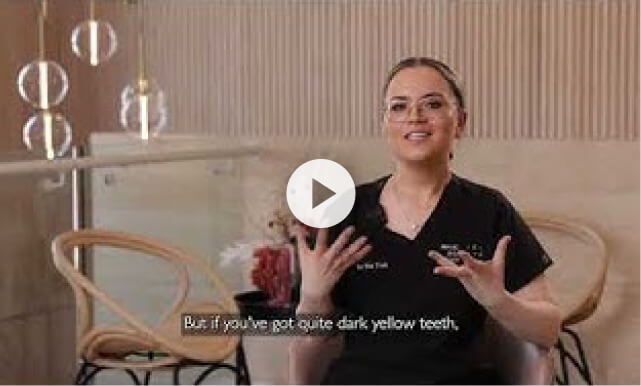Are you ready to find your picture-perfect smile? Porcelain veneers can offer that instant transformation you’re looking for, custom-made to fit your teeth and help with imperfections such as discolouration, gaps, or misalignment. However, one question that often pops up is, “How long do these veneers actually last?” We take a look at the lifespan of various types of veneers, including composite and no-prep veneers, and explore why porcelain veneers are generally considered the most durable option. If you’re heading down the path of a smile makeover and wondering how long you can expect your new pearly whites to last, then read on.
How Long Do Composite Veneers Last?
Before we dive into the longevity of porcelain veneers, it helps to take a look at different types of veneers and how they compare. Composite veneers are another popular choice, typically made from a resin material that can often be applied in just one dental visit. On average, composite veneers have a lifespan of around 5 to 7 years, with daily brushing and flossing, as well as professional cleanings.
While composite veneers are generally less expensive upfront, their shorter lifespan means that they may need to be replaced more frequently, so the costs will add up over time. If you’re looking for a long-lasting solution, porcelain veneers may be a better option.
How Long Do No-Prep Veneers Last?
No-prep veneers are another option that is gaining popularity as a convenient and less invasive alternative to traditional veneers. These veneers require little to no preparation of the tooth surface, making the procedure much quicker.
No-prep veneers can last anywhere from 7 to 10 years, depending on oral hygiene, lifestyle, and regular dental care. While this is a great lifespan, it’s important to note that they generally don’t last as long as porcelain veneers and also may not be suitable for correcting more serious dental issues.
When it comes to costs, they are generally on par with porcelain veneers. However, their lifespan is generally shorter, making them a less durable option in the long term.
Why Porcelain Veneers Last Longer
Now we’ve taken a look at the alternatives, we can look at why porcelain veneers are often considered the best option.
Material
Porcelain is a ceramic material known for its strength, resilience, and ability to mimic the natural appearance of tooth enamel. Unlike composite resin, porcelain is more resistant to staining and discolouration over time.
Resistance to Wear and Tear
Porcelain veneers are highly resistant to wear and tear compared to other materials. They are less likely to chip, crack, or suffer from surface wear, making them a more durable option in the long run.
Quality of Craftsmanship
The process of creating porcelain veneers often involves a higher degree of craftsmanship and customisation. They are usually crafted in a dental laboratory to fit your teeth perfectly.
Cost-Effectiveness
Although the initial cost of porcelain veneers may be higher, their longer lifespan often makes them more cost-effective in the long run making them a worthy investment.
Which Factors Affect The Longevity Of Veneers?
While the type of material used in veneers plays a significant role in their longevity, it’s not the only factor to consider.
Oral Hygiene
Regular brushing and flossing are essential for prolonging the life of your veneers. Neglecting oral care can lead to issues like gum disease and tooth decay, which can affect the longevity of your veneers.
Lifestyle Choices
Certain lifestyle choices can have a negative impact on your veneers:
- Smoking: Tobacco can cause staining and weaken the structure of your veneers over time.
- Diet: Foods and beverages that are high in sugar or are acidic can erode the bonding material used to attach the veneers.
- Alcohol: Excessive alcohol can also weaken the bonding agents used in veneers.
Dental Check-Ups and Maintenance
Regular dental visits are important when it comes to extending the life of your veneers. Your dentist can identify any issues early on and take corrective measures before they become major problems.
Bruxism
Teeth grinding, also known as bruxism, can significantly shorten the lifespan of veneers. If you have a habit of grinding your teeth, it’s essential to address this issue with your dentist, who may recommend a night guard to protect your veneers.
How to Make Porcelain Veneers Last Longer
Investing in porcelain veneers is a significant commitment, so it’s natural to want to ensure that your new smile lasts as long as possible. While porcelain veneers are already durable, there are several steps you can take to extend their lifespan even further.
- Maintain excellent oral hygiene: Make sure to brush your teeth twice a day using fluoride toothpaste and floss daily to remove plaque and food that can lead to decay.
- Use a non-abrasive toothpaste: Abrasive toothpastes can scratch the surface of your veneers over time, leading to dullness and discolouration.
- Don’t use your teeth as tools: Using your teeth to open bottles or tear packages can put stress on your veneers, leading to chips or cracks.
- Wear a mouthguard: If you participate in contact sports or have a habit of grinding your teeth, wearing a mouthguard can protect your veneers.
- Follow your dentist’s advice: Your dentist may provide recommendations tailored to your dental health and lifestyle. Following this advice can go a long way in ensuring that your porcelain veneers last as long as possible.
Can Porcelain Veneers Last a Lifetime?
While it’s nice to think your smile transformation will last a lifetime, is this actually realistic? Not entirely. The reality is that while porcelain veneers are long-lasting, they are not entirely immune to the effects of time, lifestyle choices, and oral health conditions. Many experts agree that with proper care, porcelain veneers can last up to 10 to 15 years, but a lifetime is a stretch.
Of course, there are always exceptions to the rules, and there have been instances where patients have reported their porcelain veneers lasting for several decades without any significant issues. If you’re considering porcelain veneers, it’s best to go in with realistic expectations while aiming to take the best possible care of them.
When Do Porcelain Veneers Need to Be Replaced?
Even with the best care and maintenance, there comes a point when porcelain veneers may need to be replaced (unless you’re one of the exceptions mentioned above). Here’s the signs to look out for that indicate the need for replacement to help you maintain that winning smile.
Signs That Your Veneers Need Replacement
- Discolouration or staining
- Chipping or cracking
- Wear and tea
- Gum recession
- Tooth sensitivity
Replacing porcelain veneers is a straightforward process. Your dentist will first remove the existing veneer and then take new impressions of your teeth. These impressions will be sent to a dental lab where your new veneers will be crafted. Once ready, your dentist will bond the new veneers to your teeth, ensuring a perfect fit and natural appearance.
Timely replacement of worn or damaged veneers is crucial for maintaining oral health. Regular dental check-ups can help in picking up any issues early on.
Do Veneers Last Longer Than Crowns?
Both veneers and crowns are popular options, so which one lasts longer?
Dental crowns are caps that cover the entire tooth. They are often used for teeth that are severely damaged, decayed, or have undergone root canal treatment. On average, porcelain crowns can last between 10 to 15 years, although some can last up to 25 years or more with proper care.
Both porcelain veneers and crowns made from high-quality porcelain can last a long time. However, crowns often have the edge in terms of durability because they cover the entire tooth. Crowns are generally more expensive than veneers, but their longer potential lifespan and greater durability can make them more cost-effective in the long run.
Crowns generally offer more durability and can last longer in cases of extensive dental issues, but veneers are a strong contender when it comes to cosmetic enhancements and less severe dental problems.
Book a Complimentary Veneers Consult
Are you considering a smile makeover? Whether you’re leaning towards porcelain, composite, or no-prep veneers, the first step towards your dream smile is a consultation. Book a complimentary veneers consultation with our experienced dental professionals at Dental & Skin Clinic. We’ll assess your dental health, discuss your aesthetic goals, and recommend the most suitable veneer option for you. If you need a little inspiration, check out our dental veneers before and after page.





